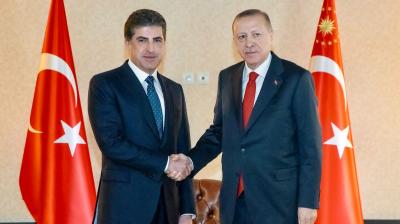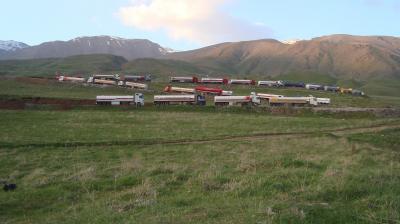Events
Conflict and Fragility
Clingendael has the pleasure of hosting an online discussion with several experts to shed greater light on a complex set of problems facing the Kurdistan Region of Iraq today. The event will be moderated by Erwin van Veen.
Speakers
-
Sardar Aziz (columnist) reflects on the Turkish agenda in the Kurdistan Region of Iraq, how it interacts with KDP and PUK interests and how the evolution of the fight against the PKK raises tensions in the area.
-
Dastan Jasim (GIGA) sheds light on the evolution of domestic politics in the Kurdistan Region of Iraq, including KDP-PUK relations and affairs between Baghdad and Erbil.
-
Kamal Chomani (journalist) examines the evolution of the relation between Iran and the Kurdistan Region of Iraq, including the delicate state of the PUK as political party and a presumed Israeli presence.
A bird’s eye overview of issues facing the Kurdistan Region of Iraq
The Kurdistan Region of Iraq is going through challenging times. The launch of Turkey’s next operation against the PKK puts the Kurdistan Democratic Party (KDP) in a difficult position between a major economic partner and its fellow Kurds. The Patriotic Union of Kurdistan (PUK) faces a milder version of the same dilemma due to its greater distance from Turkey, but this is likely to grow more acute with time and include the additional complexity of tension with Iran.
Moreover, in the Kurdistan Region of Iraq, the KDP and the Patriotic Union of Kurdistan (PUK) find themselves in opposing alliances in the protracted process of government formation, which stands in contrast with their ability over the past 15 years to form a united front. In Erbil, Duhok and Sulaymaniya, both the KDP and PUK face growing protests to their rule as socio-economic problems mount that Kurdistan Regional Government policies do not manage to address effectively, in part due to the region’s financial difficulties - aggravated by the recent ruling by the Federal Supreme Court assessing KRI oil exports as unconstitutional.
Roiled by such regional, domestic and local problems, it is not clear whether the political renewal that seems required to put the KRI on a more promising development track can be realized. On the one hand, one can imagine that the mix of top-down and bottom-up pressure incentivizes Erbil and Baghdad to institutionalize and upgrade their federal arrangements. This would require overcoming mistrust and a shift from transactional approaches to building a more strategic partnership. On the other hand, geopolitical tensions between Turkey, Iran and Baghdad may cause divides within the KRI to widen, ultimately creating zones of influence.





